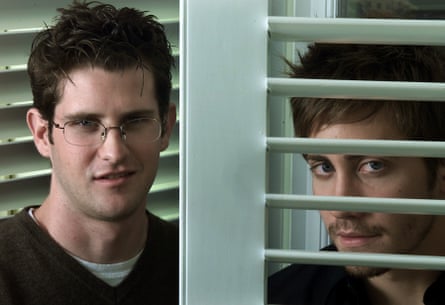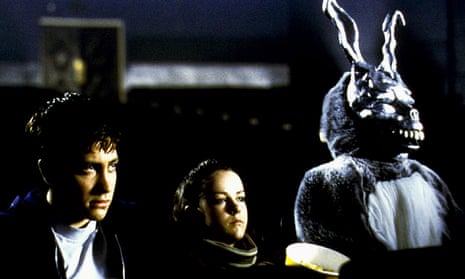Richard Kelly, director
I was 23, just graduating from film school, and in a panic trying to write a screenplay to get my career started. I remembered a news story I’d read as a kid: about a huge chunk of ice that fell from the wing of a jet and hit a boy’s bedroom, but he wasn’t there and escaped being killed. That gave me the seed of an idea.
Donnie Darko’s town was inspired by Midlothian in Virginia, where I grew up in the late 1980s, though Donnie is a little older than I would have been. Grandma Death, the old lady, was a real person and self-help lessons were actually on my school curriculum. It was meant to be an amusing and poignant recollection of suburban America in the Reagan era.
Letting someone else direct was never an option. I knew it would never see the light of day, or be drastically rewritten. Once Drew Barrymore signed on, we got the finance we needed: $4.5m. Having Drew also helped us get other actors who might have been reluctant to work with a first-time director. We originally had Jason Schwartzman as Donnie, but he had other commitments. Jake Gyllenhaal had just starred in October Sky and carried the whole movie. Though not a household name, he clearly had talent.
Because so many of the cast and crew were young, there was a real energy on the set, but I was stressed out. Being 25, I had to justify myself a lot, prove I had the skill. I lost 20lbs on the shoot. Filming Donnie’s grand entrance to high school took most of a day. It was a lengthy scene that followed characters down corridors to the sound of Head Over Heels by Tears for Fears. The production manager and line manager were furious. They saw it as an indulgent music video sequence that had no dialogue and didn’t advance the story. Plus we still didn’t have the rights for the song, which I’d choreographed all the action to. But when they saw the finished sequence, they said: “OK, we were wrong.”
Every major distributor passed on it at Sundance in January 2001. It was viewed as a problem film that no one knew how to market. It looked like it might go straight to video, but then Newmarket picked it up. They’d done Memento – another experimental film seen as a hard sell. Its director, Christopher Nolan, convinced Newmarket to give Donnie Darko a chance. Then it got released on the Halloween weekend after 9/11 and didn’t even make $1m. No one was in the mood to see any kind of movie, especially a heavy emotional one.
One year later, it started to get a second wind, becoming a bit of a cult on DVD, with people in Britain talking about it, too. I’m grateful it still resonates. It’s so rewarding to bring an original story to the table.
Jake Gyllenhaal, actor
I was frantically running around Los Angeles, doing loads of auditions. I remember pulling over to the side of the road to finish reading Richard’s script and being mesmerised. It was clearly influenced by classic directors – Ron Howard, Steven Spielberg – but with this strange psychosis. It beautifully captured the experience of moving into adulthood: the world that felt so solid becoming moveable and liquid. I thought, “This is what my adolescence felt like,” although I don’t speak, and have never spoken to, rabbits.

Richard gave me a lot of room. The voice Donnie uses when he’s talking to Frank, the demonic bunny rabbit, was my choice. As well as being this trippy figure, Frank is Donnie’s only friend, almost like a comfort blanket. So the voice is how a child would talk to his blanket.
It was my idea to have my real-life sister, Maggie, play my sister in the film. We were going through a competitive phase, which fed into the dinner-table scenes, where she tells me: “You can go suck a fuck.” Maggie was the reason I got into acting and is the more formidable of us. Yet I was the one who started my professional career first. Imagine being in a movie with your obnoxious little brother as the lead.
The film took a long time to be found. It started in the UK. I’d just finished a play in London and started doing press for Donnie Darko. The response was so different compared with back home: Brits seem to appreciate that, if you have something special, it doesn’t have to be perfect. They acted like they’d found a kindred spirit.
It wasn’t a conventional adulthood film in the American Pie way. Donnie talks about jerking off, but that’s only a part of it. His psychological journey is what’s important. That’s why it’s had this lasting power. Anything psychological has a slower – but ultimately longer – burn.
- The 4K restoration of Donnie Darko is at the BFI, London, 17-30 December and nationwide from 23 December. Details: bfi.org.uk. This article was amended on 13 December 2016. The previous version stated Vince Vaughn and Mark Wahlberg were considered to play Donnie Darko.

Comments (…)
Sign in or create your Guardian account to join the discussion